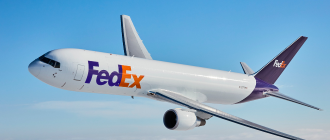
How Japan And Korea Are Redefining The Future Of Air Freight
By FedEx | November 12, 2025
Japan and Korea are powering air freight growth in Asia Pacific through fast-moving sectors like semiconductors, automotive, and fresh produce.
Discover how FedEx’s comprehensive freight shipping services are helping businesses move heavy shipments across borders with speed and precision.
- Strong e-commerce and export demand in Japan and Korea is driving rapid growth in air freight, which is projected to nearly double in value for Japan by 2032.
- Industries with high-value and time-sensitive cargo, such as semiconductors and automotive exports, rely on air freight’s speed and precision.
- FedEx’s freight shipping services provide enhanced visibility, temperature control, and time-definite delivery to help businesses ship heavy, urgent, or delicate goods globally.
From high-bandwidth memory chips to premium wagyu beef, Japan and South Korea’s exports increasingly rely on the speed and reliability of air freight.
Both countries have export-driven economies that are fueling Asia’s freight momentum through high-value and time-sensitive industries such as semiconductors, automotive, and fresh produce. Despite differing market dynamics, they share common growth drivers: global trade realignments, shifting tariffs, and supply chain diversification across Asia.
These factors are reinforcing the role of air freight – which, at FedEx, refers to shipments over 68 kg – as the backbone of high-value trade. FedEx supports this demand through specialized freight services with end-to-end visibility and near-real-time tracking, enabling businesses to expand across borders efficiently.
Below, we explore the key industries and export trends shaping the air freight boom in Japan and Korea, and how FedEx helps businesses stay ahead of the curve.
E-commerce boom: Demand for fast deliveries fuels faster freight
Cross-border e-commerce continues to soar across both markets. Consumers now expect swift delivery even for international orders, prompting merchants to rely on air freight to move goods faster and in higher volumes.
In Japan, this momentum is unmistakable. The country’s e-commerce market is projected to grow by 7.7% in 2025, fueled by mobile penetration and the rise of international brands. This e-commerce boom is driving growth for Japan’s cross-border logistics market, which is estimated at USD 5.87 billion in 2025 and forecasted to reach USD 7.47 billion by 2030.
As local retailers tap into global demand, Japan’s air freight market is also set to rise from USD 15.71 billion in 2024 to USD 28.82 billion by 2032. To keep pace, logistics providers are investing in advanced supply chain digitization and opening new air cargo routes to support growing volumes from online sellers.
Korea mirrors this growth story. The country’s e-commerce market surpassed USD 100 billion in 2024 and is projected to reach USD 160 billion by 2026. The global appeal of Korean beauty and fashion continues to drive export demand. Merchants must handle high volumes of international orders and deliver on customer expectations for speed, making air freight shipping a critical part of their supply chain.
At FedEx, services such as FedEx International Priority Freight and FedEx International Economy Freight enable e-commerce sellers to meet and exceed these expectations. With time-definite delivery and digital tracking, our freight solutions allow merchants to ship in bulk and get products to global customers on time.
Surge in semiconductor demand: High-value tech takes to the skies
Japan and Korea jointly anchor the global semiconductor supply chain – with Japan leading in materials and equipment, and Korea dominating chip fabrication. The delicacy and high value of these bulky shipments make air freight the transport mode of choice.
In Japan, semiconductor exports continue to surge. The country holds roughly 30% of the global semiconductor equipment market, achieving record-high equipment sales of JPY 2.831 trillion from January to August 2024. As domestic subsidies encourage manufacturing, Korean firms are responding by placing more orders. For example, Towa, a Japanese company producing machines for high-bandwidth memory (HBM) chips, has seen rising demand from Korean memory giants Samsung and SK Hynix.
Korea’s semiconductor growth is just as compelling. The country’s semiconductor exports are projected to exceed USD 165 billion in 2025, setting a new record for the second year in a row, driven by strong global demand for AI-related chips. Between January and September 2025 alone, semiconductor exports climbed 16.9% year-on-year to USD 119.7 billion, accounting for a major share of Korea’s total exports.
These high-value, temperature-sensitive shipments require exceptional precision. FedEx supports semiconductor exports with customized air freight solutions that include temperature controls and 24/7 monitoring, helping businesses deliver cutting-edge technology safely and swiftly.
Rise in automotive exports: High-value parts drive growth
Both Japan and Korea are turning to air freight to meet global demand for urgent, high-value automotive exports – from EV batteries to precision components.
In Japan, automotive logistics plays a pivotal role in sustaining export competitiveness. The automotive industry uses air freight to deliver high-value items and urgently needed components, with gearboxes and related parts becoming the country’s top air export by value in 2024.
Japanese cars remain popular with international customers too. The country’s vehicle production rose by 1% year-on-year in August 2025 to over 513,000 units, buoyed by strong overseas demand from markets like the US, Canada, and Australia.
Meanwhile, Korea’s automotive air freight market is accelerating. Cars and automobile parts were among the country’s top five export products by value in 2024. Despite tariff pressures, exports rose over 8% year-on-year in July 2025, thanks to surging shipments to Europe. Strong demand for eco-friendly vehicles is also fueling time-sensitive exports that require fast, reliable freight shipping.
At FedEx, we’ve developed automotive logistics solutions built for speed and precision. Our specialist services support just-in-time manufacturing with dedicated customer care, advanced visibility, and fast international freight connections.
Delivering freshness across borders: Japan and Korea’s premium produce and meat exports
From wagyu beef to Korean strawberries, premium foods and perishables are becoming export sensations across Asia. To preserve freshness and meet international quality standards, exporters need temperature-controlled air freight to reach customers quickly.
In Japan, exports of premium meats are climbing fast. Its beef exports, from January to May 2025 in particular, rose 24% year-on-year, highlighting the country’s growing role in supplying Asia’s premium food market.
Korea is also seeing record highs in perishable trade. In 2024, the country imported USD 1.45 billion worth of fresh fruits, a 20% increase year-on-year and its highest figure ever. Meanwhile, exports of K-food and related products reached USD 12.1 billion in 2023, as domestic produce like strawberries and grapes win popularity across Southeast Asia.
To maintain freshness from farm to fork, cold-chain and same-day shipping services ensure reliable, temperature-controlled delivery for exporters. For instance, FedEx offers a same-day fruit delivery service from Korea to Hong Kong, ensuring perishable shipments meet strict freshness and safety standards.
Take to the skies with air freight
Japan and Korea’s technological and cultural exports show no signs of slowing. From chips to cars, both countries depend on air freight for speed, reliability, and precision. As trade patterns evolve and consumer expectations rise, air freight continues to enable economic resilience, connecting exporters with buyers worldwide faster than ever.
FedEx empowers businesses of all sizes – from electronics leaders to SMEs in food exports – to reach global markets through extensive air freight networks and near-real-time tracking. Explore how FedEx’s international freight services can move your business forward here.
SHARE THIS STORY
- 85% Of APAC Businesses Plan To Expand Into Europe, According To New FedEx Report
- Generative AI: A New Frontier
- How To Ship A Giant Panda
- The Rise Of Intra-Asia Trade: Opportunities In The China-Southeast Asia Corridor
- Where Do Old Planes Go When They Retire?
- What’s So Dangerous About Coconuts? Your Guide To Dangerous Goods Logistics
Sign up now and save on your shipping rates!
Sign up now and earn discounts by shipping instantly with FedEx Ship ManagerTM at fedex.com.
Recommended For You

85% Of APAC Businesses Plan To Expand Into Europe, According To New FedEx Report
Download FedEx’s new Asia-Europe Trade Report to uncover the latest market trends and opportunities shaping cross-border growth.
Read More
ASEAN Is Korea’s Next Big Market For Intra-Asia Trade Growth
Intra-Asia trade is booming, and ASEAN is emerging as a hub of opportunity. How can Korean businesses gain a competitive edge in Southeast Asia?
Read More
Air Freight Trends 2026: How Asia Pacific Is Redefining Global Trade
Uncover the key air freight trends shaping global trade in 2026, from evolving trade lanes to rising e-commerce freight demand.
Read More

